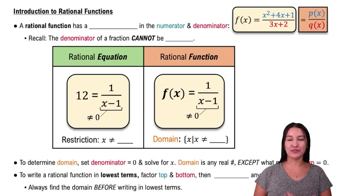Here are the essential concepts you must grasp in order to answer the question correctly.
Domain of a Function
The domain of a function refers to the set of all possible input values (x-values) for which the function is defined. For rational functions, the domain is typically restricted by values that would make the denominator zero, as division by zero is undefined.
Recommended video:
Domain Restrictions of Composed Functions
Rational Functions
A rational function is a function that can be expressed as the ratio of two polynomials. In the case of h(x) = 4/(3/x - 1), the denominator must be analyzed to determine where the function is undefined, which directly affects the domain.
Recommended video:
Intro to Rational Functions
Finding Restrictions
To find the domain of a function, one must identify any restrictions on the variable. For the function h(x), this involves setting the denominator equal to zero and solving for x, as these values will be excluded from the domain.
Recommended video:
Restrictions on Rational Equations



